Posted March 28, 2023 by Nicky in Reviews / 0 Comments
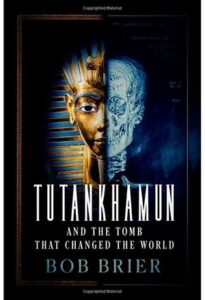 Tutankhamun and the Tomb that Changed the World, Bob Brier
Tutankhamun and the Tomb that Changed the World, Bob Brier
I’ve been fascinated by ancient Egypt since I was a kid, like many people. One of the books that fed that interest when I was a teenager was Bob Brier’s The Murder of Tutankhamen, so I was intrigued to get this and read about his current take on the state of Tutankhamun studies. I also knew he said some things people found controversial and unnecessary about Howard Carter (highlighting what appeared to be thefts from the tomb), which… I was curious about, and not too surprised about.
Brier writes engagingly, and there’s a lot of fascinating stuff. I did find it not always entirely clear when a theory was considered solid or not — sometimes he’d report a recent theory and say that this and that were found on experimentation, and give all positive-sounding evidence about it… and then sort of step back and say well, we can’t trust that evidence. It’s probably easier to digest if you discuss both the positives and the negatives all in one go! (In particular I found this with the chapter aDNA testing on the mummies to establish familial relationships. Brier sounded like he was behind their conclusions, at least to me, and then in the next chapter mentioned how obviously it couldn’t be true.)
It’s definitely an interesting update both on the understanding of Tutankhamun and on Brier’s understanding of Tutankhamun, especially if you read his popular book, which suggested that Tutankhamun was murdered, when it was current. He’s completely disavowed all those theories now, but makes brief reference to them here.
It remains a popular book and biased, I think, to the author’s specific interests and view of the world. For example, he repeatedly conflates disability with frailty, which may or may not be true (someone with a club foot may still be fairly hale in other ways, for example). He’s very keen to portray Tutankhamun a certain way, and it’s important to remember that Brier is not neutral (no one is) in those interpretations. Some of this stuff we just don’t know, and is very difficult to know now thanks to the poor condition of Tutankhamun’s body.
Rating: 4/5
Tags: Bob Brier, book reviews, books, history, non-fiction
Posted March 13, 2023 by Nicky in Reviews / 2 Comments
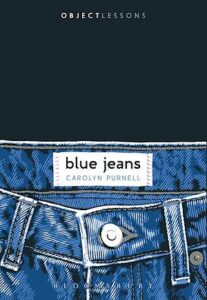 Blue Jeans, Carolyn Purnell
Blue Jeans, Carolyn Purnell
This is a sort of non-fiction I really like — something that focuses on an everyday object and unpicks it. Here it’s blue jeans, and goes into the colour, the garment, how they became combined, and the fashions around them and perceptions of them. Parts of it, like the creation of indigo, I already knew about, but it’s different to have the facts marshalled together like this and get a really clear view on how the creation of synthetic indigo has led to huge pollution from the jeans industry.
Carolyn Purnell writes well and clearly, and without personal anecdote getting too much in the way — rather, the glimpses of her personal opinions and her family’s history with jeans helped to illuminate the topic.
I really enjoyed it.
Rating: 4/5
Tags: book reviews, books, Carolyn Purnell, history, non-fiction
Posted March 11, 2023 by Nicky in Reviews / 0 Comments
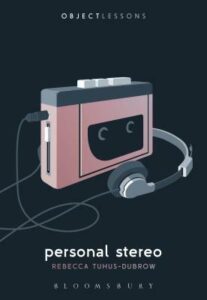 Personal Stereo, Rebecca Tuhus-Dubrow
Personal Stereo, Rebecca Tuhus-Dubrow
I love the idea of this series, but I chose this one somewhat at random — and it was a winner for me! I’m just old enough to have used a Walkman for a while before I started using things like CDs and a minidisk player, before moving onto an iPod. I was that kid blocking out all the other kids, as a teenager, though by then it was definitely CDs/minidisk/iPod: I was the one in my own little world, and I needed it amidst all the bullying at my school — an aspect of why people might have chosen personal stereos that doesn’t quite get covered here, though the concerns about people going off into their own little world, as well as the pleasures thereof, are covered.
The author has quite the nostalgia for personal stereos, but tries to look at them critically and pick apart the nostalgia to see what they really were. In some ways, the societal reaction to them was very similar to that toward mobile phones: they were making people anti-social, they were ruining all kinds of things, they were dangerous, etc. Always funny to see that we’re the same throughout generations…
It’s a short read, and I found it worthwhile. Surprisingly touching in some ways (the story of the co-founders of Sony, both having had strokes, communicating silently and remaining friends, for instance). I was absorbed enough to read it in less than an hour, without putting it down.
Rating: 4/5
Tags: book reviews, books, non-fiction, Rebecca Tuhus-Dubrow
Posted March 9, 2023 by Nicky in Reviews / 2 Comments
 Tutankhamun’s Trumpet: Ancient Egypt in 100 Objects, Toby Wilkinson
Tutankhamun’s Trumpet: Ancient Egypt in 100 Objects, Toby Wilkinson
I love this style of history, selecting objects and focusing in on what they tell us, and I was hugely into Ancient Egyptian history when I was a teenager (obsessing in particular over Christine Desroches-Noblecourt’s book on Tutankhamun). So it’s no surprise that I really enjoyed this in a partly nostalgic way.
Unlike some other books of this type, it doesn’t explicitly mention at the start of each section which object is being discussed. Sometimes the object introduces the history that Wilkinson wants to explore; sometimes there’s a description of the state of affairs too, and then Wilkinson brings in the object that illustrates that from the tomb. Sometimes the object is mentioned rather glancingly, which is somewhat disappointing: I love it when historians and archaeologists really focus in and look at the object as an object as well as a symbol of hundreds of years of history.
Overall, I found this enjoyable, and despite eagerly reading many books both specifically about Tutankhamun and more generally about Ancient Egypt, I definitely found new information and (perhaps even better) new interpretations here. I’m reading Bob Brier’s Tutankhamun and the Tomb that Changed the World right now, for example, and he only mentions the usual theory that the tombs of many past pharoahs were looted by robbers and their mummies rewrapped and rehidden by the state “to protect them from further desecration”. Wilkinson instead mentions state-sanctioned looting in Ramesses XI’s reign to fund General Paiankh’s campaigns — something I don’t recall reading about anywhere else before.
Definitely got on better with this than A World Beneath The Sands, which bodes well for the other Wilkinson book I have on my TBR pile.
Rating: 4/5
Tags: book reviews, books, history, non-fiction, Toby Wilkinson
Posted March 6, 2023 by Nicky in Reviews / 0 Comments
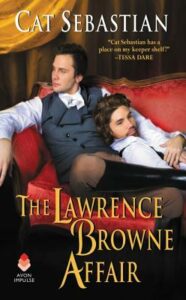 The Lawrence Browne Affair, Cat Sebastian
The Lawrence Browne Affair, Cat Sebastian
The Lawrence Browne Affair features a side character from the first book: none other than Georgie Turner, conman and thief extraordinaire. I wasn’t a huge fan of his character from his portrayal in the first book, but I’ve thought that before with Sebastian’s books, and she made it work once we’re in close-third POV and can see Georgie’s thoughts and understand his damage.
Once again, she surprised me with the way the plot worked out. The easy and obvious conflict was not what happened, and the characters trusted each other and the bond they were forming, in a way that often doesn’t happen in romance novels (and presumably real life, but I don’t enjoy it there either). Okay, people didn’t quite manage to communicate properly and talk out their problems — but at least they avoided throwing away all the evidence they’d seen with their own eyes, and avoided just believing the worst of each other instantly. Even though it would, in fact, be all of a piece with their pasts. (I’m trying to be a little vague here.)
It’s sort of a Beauty and the Beast story, which amused me too, and I enjoyed the way Georgie came to realise that he actually liked a lot of his marks — it’s what made him a good conman, and also a part of why he was so unhappy as a conman.
Overall, a sweet book and one I enjoyed. I loved Lawrence finding himself.
Rating: 4/5
Tags: book reviews, books, Cat Sebastian, historical fiction, queer fic, romance
Posted March 4, 2023 by Nicky in Reviews / 0 Comments
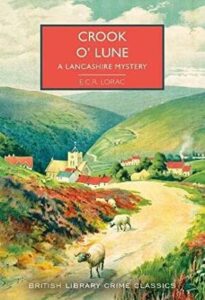 Crook O’ Lune, E.C.R. Lorac
Crook O’ Lune, E.C.R. Lorac
Crook O’ Lune is very typical of E.C.R. Lorac’s books: maybe slower than some, but using a strong sense of place to give the story atmosphere, and to create a mystery that fits into the setting, the lie of the land, the kind of people. It’s perhaps even better at that because Lorac based it on a real place, and even on her own house: you can feel the love for the house, the land, the way of life, in all the characters.
Of course, it’s a little idealised, and rather anti-urban in sentiment — even people who come from outside are by and large calmed by the land, connected to it all of a sudden, in a way that doesn’t ring so true to me (or maybe it’s just the changing times, and everybody was closer to the land then, and more able to be absorbed back into a rural community).
The mystery in this one takes a long time to get going, but it’s all necessary set-dressing, and it’s all relevant. I didn’t ‘catch’ the killer ahead of time, this time: I suspected someone else, based on details that… I’m not sure whether they were intended as red herrings or just part of the set-dressing. But it all makes sense in execution, and despite some of the sordid deeds and the sense of increasing hurry about figuring out what happened, it was a very relaxing read — you can rely on Lorac for that!
Rating: 4/5
Tags: book reviews, books, British Library Crime Classics, crime, E.C.R. Lorac, mystery
Posted March 2, 2023 by Nicky in Reviews / 2 Comments
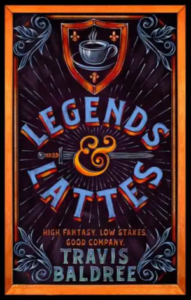 Legends & Lattes, Travis Baldree
Legends & Lattes, Travis Baldree
Legends & Lattes is a rare book that I wanted to read again as soon as I was finished with it — it’s warm and cosy, a world with a lot of goodness in it and people who will make an effort and put in work, even when it’s hard. A world where even an orc can quit being a mercenary and make a coffee shop, and a rattkin can come on staff to make baked goods, and a succubus (who doesn’t use any of her charms) can come on board as a barista. It’s a world where a far-fetched dream can come true with a little magic, a little luck, and a lot of willing hands.
Honestly, I got to the end of it and was a little outraged that the bit I thought was left was an additional short story and not more of the same coffee-scented cosiness. I wanted more of Viv, more of the coffee shop, more of the little mysteries around it (the gnome who seemed to be some kind of time traveller, for example).
I think some people have dinged it rating-wise for not being original, which is a little bit confusing to me: it’s not meant to be some spectacular and strange fantasy world with intricate world-building. It’s more like “here’s a generic fantasy world, and here’s the kind of story we don’t tell set in this kind of world very often”. The world-building is far from the point — it’s more taking this basic fantasy world and saying, well, not everyone can be a mercenary all their life. What do they do after? What do they do if killing people isn’t what makes them happy?
So I wouldn’t go in expecting something super original, because it’s not about that. It’s a mug of hot coffee (or hot chocolate, if that’s more your thing, as it is for me) on a cold day; a friend’s shoulder leaning into yours while you’re just going about your day.
Rating: 5/5
Tags: book reviews, books, romance, SF/F, Travis Baldree
Posted February 27, 2023 by Nicky in Reviews / 3 Comments
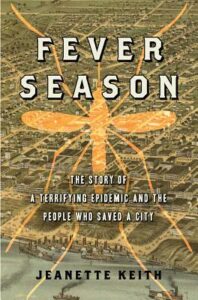 Fever Season: The Story of a Terrifying Epidemic and the People Who Saved a City, Jeanette Keith
Fever Season: The Story of a Terrifying Epidemic and the People Who Saved a City, Jeanette Keith
My interest in this book was mostly from a scientific perspective, rather than the historical, but it seems that there weren’t many scientific takeaways from this epidemic — or at least, this book isn’t interested in discussing them, though it briefly mentions that there were scientists and doctors in Memphis during the outbreak who tried to get what information they could.
Fever Season is more a historical chronicle, an attempt to draw together eye-witness accounts and historical events and make a record of the suffering and death the city suffered, with some nods to how that later influenced Memphis’ growth as a city. Keith writes with quiet sympathy for the major players, identifying the people who stayed, who did their best to combat the suffering. The discussion of the nurse Kezia DePelchin in particular is very sympathetic, showing her sadness, the ways she suffered as an onlooker.
It’s a fairly dry narrative, all the same, and it assumes at least some pre-existing knowledge about Memphis and the political situation in the US in that period. Nothing a bit of Googling couldn’t teach me, but that and the dryness made it heavy going in some ways.
Rating: 4/5
Tags: book reviews, books, history, Jeanette Keith
Posted February 21, 2023 by Nicky in Reviews / 0 Comments
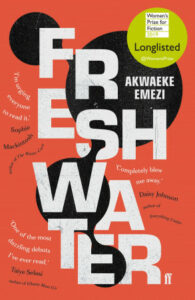 Freshwater, Akwaeke Emezi
Freshwater, Akwaeke Emezi
Freshwater is fascinating and difficult to get a hold of and describe. To say too much would spoil the experience, I think, and anyway to say anything feels like holding onto water. If I were to just describe the book, I’d have to decide whether to take some elements literally, or whether to discuss it in a spiritual/supernatural light.
So I won’t do that. What I will say is that you need a strong stomach to read this. The main characters hurt themselves and others, deliberately; the main character is abused by others in various different ways. There’s a suicide attempt (and related hospital trip), there’s parental neglect in two different flavours. There’s a religious aspect, too, which some might find uncomfortable reading.
It’s not an easy read, but fascinating; there’s much to unpick in a discussion with others who’ve read it. In the end, it wasn’t entirely for me, but I’m glad I read it.
Rating: 3/5
Tags: Akwaeke Emezi, book reviews, books
Posted February 19, 2023 by Nicky in Reviews / 0 Comments
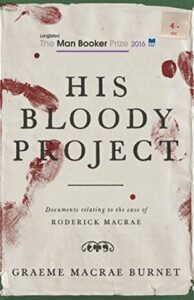 His Bloody Project, Graeme Macrae Burnet
His Bloody Project, Graeme Macrae Burnet
His Bloody Project was an interesting read right after Murder: The Biography, since it touches on the same themes of what is right and just when someone might not be in their right mind — and how you would tell. I could easily imagine this fictional case of Roddy Mcrae being one of the cases discussed in Murder: A Biography, in how Roddy is treated by the law and whether that’s just. (On the other hand, His Bloody Project leaves open the possibility that Roddy knew full well what he was doing, and that he murdered Flora and covered it up via his murder of Lachlan, hoping for more mercy for a “justified” killing.)
The format gets a little repetitive, since things are repeated between the various witness statements, Roddy’s own writing, and the court case itself. Each has subtle variations that cast light on Roddy’s character from different points of view, of course, but even with that cleverness, it’s still repetitive.
After reading it all, I’m still left that little bit uncertain about what to conclude. Was Roddy sane, did he plan this out? Was his written confession an elaborate lie? Does he remember exactly what he did to his victims? I think the hints are telling us that he committed the murder in a very planned way, and then wrote his narrative to cover it up — but there are spaces in between and subtleties that make it hard to be very sure. It’s very cleverly done, even though it isn’t comfortable reading.
Rating: 3/5
Tags: book reviews, books, crime, Graeme Macrae Burnet
 Tutankhamun and the Tomb that Changed the World, Bob Brier
Tutankhamun and the Tomb that Changed the World, Bob Brier








